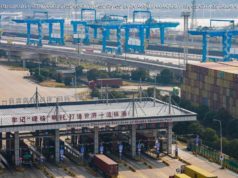The president continues to think only military and economic might matter. China knows better.
President Donald Trump’s decision to remove the U. S. from the Paris climate agreement is yet another manifestation — alongside the budget submitted to Congress and the president’s speech at NATO headquarters in Brussels — of how he continues to see U. S. interests as narrowly economic, and U. S. influence as exerted solely through hard power.
Had the president a more expansive view of both the nation’s interests and influence, he would have kept the U. S. in the accord. Instead, he not only harmed global efforts to address a pressing problem, but also deprived the U. S. of an important source of so-called soft power. In a world in which military might is increasingly difficult and costly to use, America will suffer from this loss.
My Harvard colleague Joe Nye coined the term soft power, defining it simply as « the ability to get what you want through attraction rather than coercion or payments. » According to Nye, the soft power of a country depends largely on three components: its culture, its political values, and how it conducts itself in the world and at home. To the extent that these three factors are attractive to others, a country can wield considerable sway abroad. This soft power complements more traditional notions of hard power: the military, the economy, and coercive elements of policy.
Contrary to a view in which the U. S. cows or pressures others into doing its bidding through its military power alone, it has long relied on soft power to shape the world in a way conducive to its interests. For instance, this year marks the 70th anniversary of the Marshall Plan, an initiative the U. S. took to help rebuild Europe, including Germany, after the devastation of World War II. During the Cold War, the attractiveness of U. S. ideas, values, and policies helped inspire those living under Soviet rule to oppose it, and allowed the U. S. to sustain alliances in the face of decades-long pressure from Moscow.
The U. S. had, and continues to have, many sources of soft power, be it our technologies, universities that attract hundreds of thousands of foreign students each year, or many elements of our popular culture. But a new and significant source of soft power was U. S. leadership on an issue that virtually every country in the world cares enough about to have devised a national action plan: climate change.
While the U. S. cannot claim all the credit for producing the Paris accord, the Barack Obama administration was widely seen as having been a critical driver. America became the champion of many countries that view climate change as an urgent, if not existential, problem. This global goodwill was extinguished overnight with Trump’s announcement — and with it, the countless ways in which the U. S. could have leveraged it to achieve other, non-climate related goals.
The most specific and likely most important example of how this will affect tangible American interests is with the relationship with China. Much has already been said about how Washington, in withdrawing from the Paris agreement, has handed China a geopolitical gift by ceding global leadership role to Beijing. Trump’s abdication is no doubt welcomed by Chinese President Xi Jinping, who is making a big push to increase Chinese soft power in the world — even speaking of it in these terms.
But what few appreciate is how climate was one of a perilously small number of issues on which Washington and Beijing had managed to build a cooperative relationship.
Perhaps ironically, the boom in U. S. shale gas production helped the U. S. bring down the country’s 2015 per-capita carbon emissions to a level not seen since the early 1960s. This helped give the Obama administration credibility when it approached Chinese officials to forge a bilateral agreement in which both countries would commit to reining in carbon emissions.
This 2014 agreement was followed by three additional joint climate pacts and other initiatives — such as the U. S.-China Clean Energy Research Center — that have been the basis for constructive cooperation between two countries otherwise mired in tense and suspicious relations.
The hope was not only that the partnership between the U. S. and China would be good for the environment and climate, but that the personal relationships and mechanisms built through this engagement would have positive spillover effects into more tendentious issues. With tensions high on the Korean Peninsula and in the South China Sea, and with Russian President Vladimir Putin aggressively seeking to position Moscow as a better partner than Washington, removing one of the few points of common interest and real cooperation between the U. S. and China is nothing short of folly — even if you cared not an iota about climate.
President Trump had other options than simply declaring the costs of meeting climate targets too high for the U. S. Given the inefficiencies and costs associated with Obama’s Clean Power Plan, Trump might have instead galvanized Americans — through more funding for research and development and other policies — to find better ways of meeting U. S. pledges made in Paris.
Such innovations could have themselves been both an economic boon to the U. S. and a source of soft power if shared with countries struggling worldwide to meet climate challenges. Now that would have truly made America great again.
This column does not necessarily reflect the opinion of the editorial board or Bloomberg LP and its owners.
To contact the author of this story: Meghan L. O’Sullivan at Meghan_OSullivan@hks.harvard.edu
To contact the editor responsible for this story: Tobin Harshaw at tharshaw@bloomberg.net






